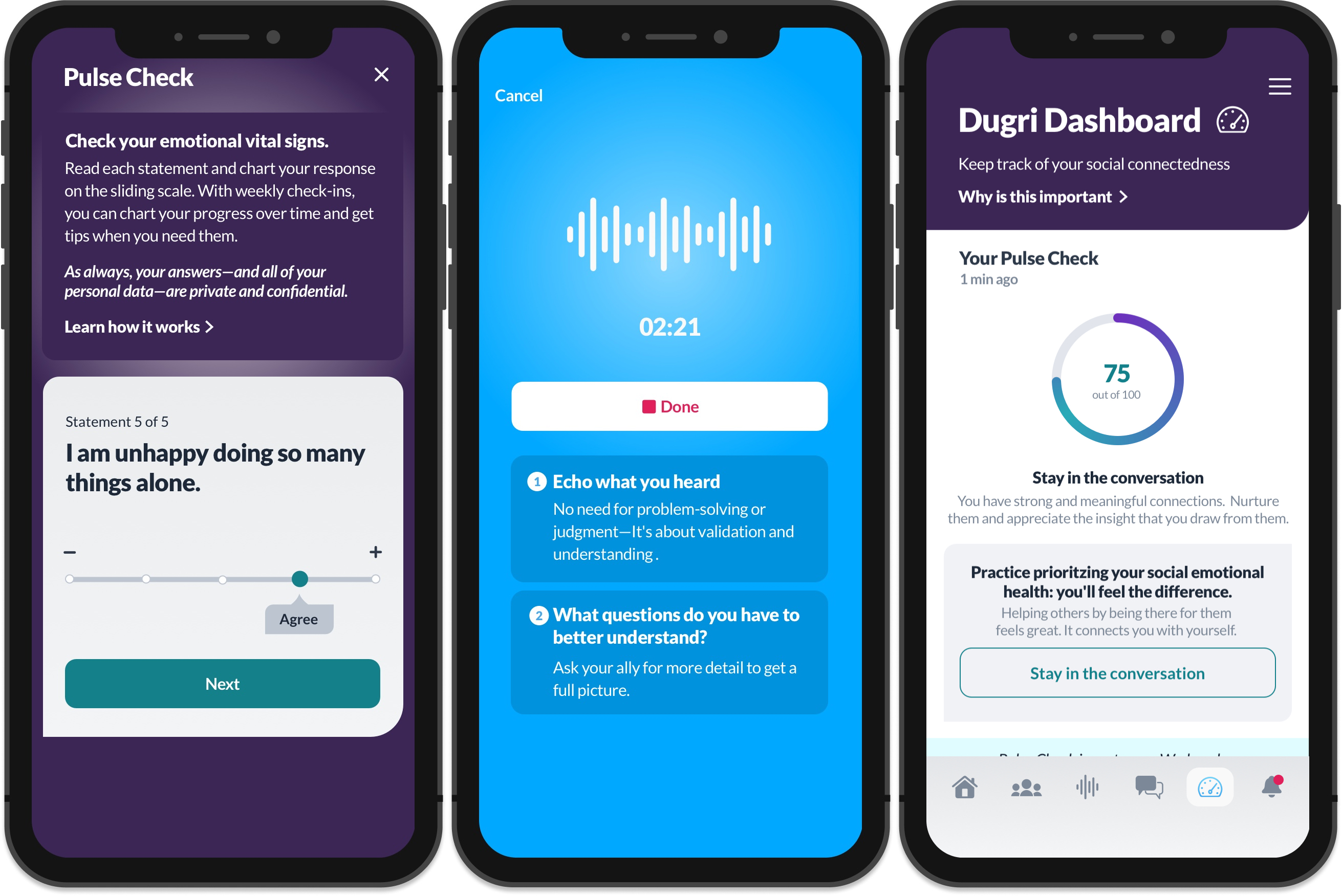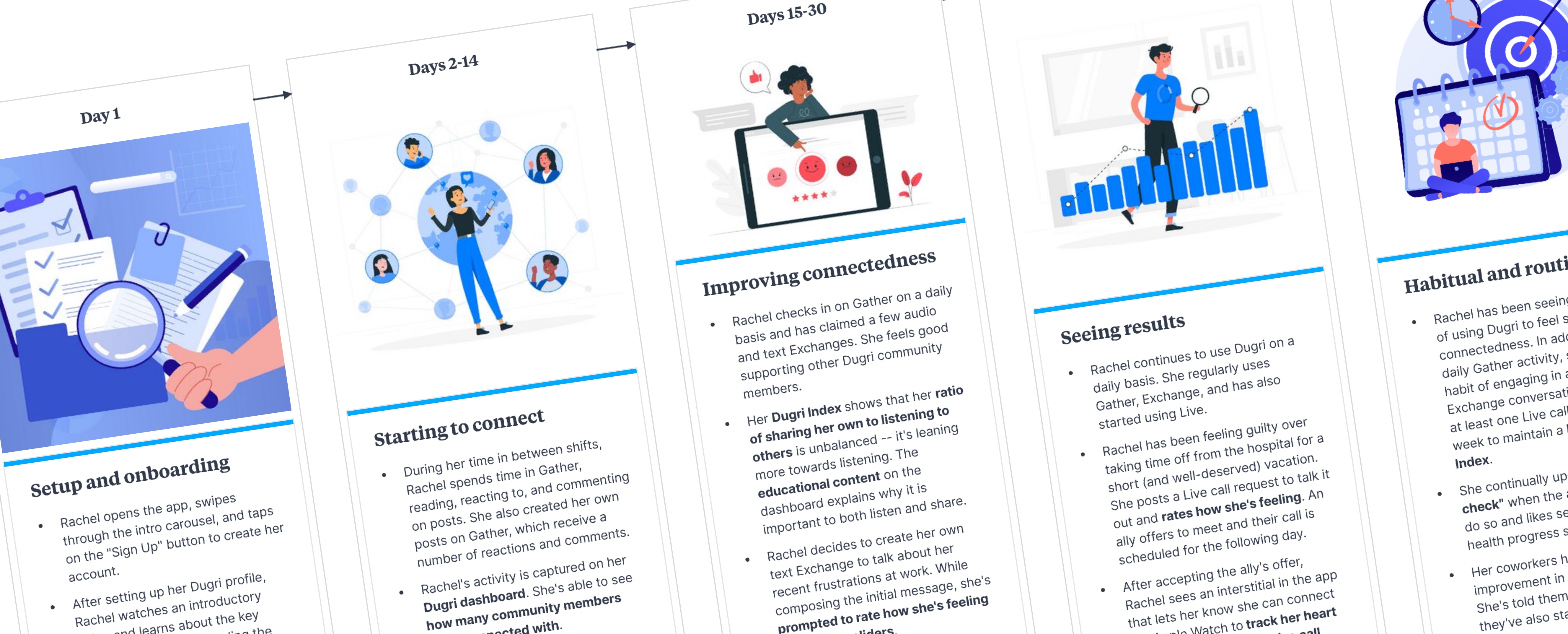Scaling a Unique Peer Support Network
A safe and anonymous peer support network that helps people increase wellness and resilience while decreasing stress and burnout.

A safe and anonymous peer support network that helps people increase wellness and resilience while decreasing stress and burnout.

Hebrew slang for “straight talk,” Dugri is a safe and anonymous peer support network that helps people increase wellness and resilience while decreasing stress and burnout. Initially developed and deployed by the Israeli Navy SEAL special forces unit, the Dugri Protocol de-stigmatizes emotional, real talk in high-performance cultures, and is used today by soldiers, medical teams, first responders, and ordinary civilians all over the world. The unique Protocol is the result of 20 years of resiliency training among hundreds of thousands of professionals.
As we sought to digitally scale the Dugri protocol, Cantina has been instrumental at every step of the way. From experience strategy to technology and design, they have been an outstanding partner, always pushing to ensure our vision came fully to life. We truly value their partnership and expertise.
The COVID-19 pandemic was the impetus for turning the Dugri Protocol into a digital product. During the pandemic, medical caregivers struggled with unprecedented levels of fatigue, stress, and grief. Dugri saw that translating the Protocol into a digital product could scale its reach and impact for this community, and eventually, other communities facing similar challenges.

Dugri came to Cantina with a minimally viable product (MVP). But, they faced numerous challenges. Shortly after starting work together, we decided to rebuild the existing app and simultaneously expand it to include the military veteran community.
Because both healthcare workers and military veterans dedicate themselves to helping others, there is often an unstated barrier to seeking self-care. Their need for a solution like Dugri felt especially urgent. Our challenge was to ensure the digital experience created the connections and engagement necessary for the Protocol to succeed just as well online as it had in-person.
To achieve this outcome, we focused on four, interconnected areas:
Technology is critically important to the development of a successful digital product like Dugri. A great experience isn’t just defined by what it looks like, but by how it works. In practice, architectural choices must be smart and forward looking, even as implementation is focused and efficient. And in the early phases, the goal must be to find a right-sized approach that enables scale and growth without over-engineering the solution.
Cantina’s VP of Technical Strategy at Cantina took on the somewhat unique role of “CTO for hire” at Dugri. In addition to advising Dugri’s leadership team and actively influencing strategic decisions, Cantina’s CTO-for-hire oversaw the re-architecture and re-tooling of the software and infrastructure to ensure Dugri was prepared for the next phases of development.
While expertise in the role was a foundational necessity, credibility and good judgment were equally important. Good decision making at an executive level rests on wise counsel you can trust. This was especially important as our work expanded to include experience strategy.
Translating a successful in-person activity to digital comes with risk. There's a risk of missing the forest for the trees by focusing on features rather than experience. Without a clear definition of “why,” features and technology take on a life of their own, dictating the shape of the experience according to their own logic, rather than reinforcing the solution that users need.
This is why we introduced the Outcomes-Based Roadmap workshop at a key pivot point in the project.
Traditional roadmaps tend to follow a waterfall format, with a list of features and a strict timeline. But, there’s a problem with the traditional approach. It’s not clear why we need a particular feature or, indeed, how we should prioritize one feature over the other. While the waterfall format appears highly efficient on the surface, misaligned assumptions can derail the product development process at unexpected moments.

By moving from a focus on outputs to one focused on outcomes, we were able to lay the essential groundwork for success. Together, we articulated a shared understanding of the “why” behind the product; outlined the impact we expected the product to have; and defined a clear plan to prioritize features and functionality based on the value delivered.
In this way, the workshop addressed the three critical ingredients to product success: clarity to eliminate risk from assumptions; alignment between stakeholders and the product team; and empowerment of the product team to solve problems, rather than implement features.
Dugri is a service that’s intended to change people’s behavior in the real world. But, just because you can do something, doesn’t mean you will.
Design has a role to play beyond simply being usable or pleasing to the eye. Good design helps people achieve their goals. And sometimes to achieve their goals, users need to form new habits.

This was particularly important for the communities Dugri initially targeted: healthcare workers and military veterans. These are communities that take care of others. But, as people who always give, they often face unstated stigma against caring for themselves.
While Dugri can be used once for talking about a specific traumatic incident, it works best when it’s used on a regular basis. Ideally, then, the user experience had to help people engage with the service to support a change in behavior over time, a habit which didn’t always come naturally.
This is where behavior change design came into play. As part of our UX work, we created a user journey to better understand where and how the app could encourage the right habit formation.
The journey formed the foundation for experiences like Pulse Check and the Dashboard, which were iteratively prototyped and tested with real users, to confirm they were intuitive, userful, and meaningful.

On top of this, Cantina refined the visual design for the app to ensure the right feeling came through in every interaction, and produced in-app “how-to” and promotional videos where users are warmly welcomed and supported.
Building on technical strategy, product strategy, and user experience, Cantina engineered a compelling digital app, available in the App Store and Google Play Store today. It enjoys a 5.0 star rating and has been recognized with a Gold Award by W3 for best Health & Wellness Mobile App. Clarity of vision, a focused user experience, a stable technical foundation, and a backlog of feature candidates have set Dugri on the path to success and growth.
If you are interested in learning more about this engagement or how Cantina can help you with a project contact us today. We'd love to help.